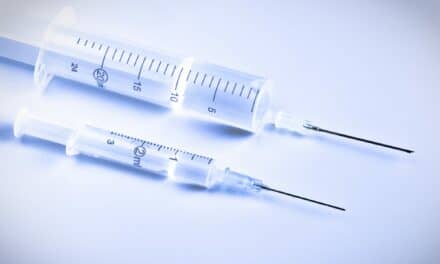Estimated reading time: 8 minutes
FDA panel favors approval for two RSV vaccines, ‘Tripledemic’ hits US households, and a monoclonal antibody may be ready for next season—here are five RSV stories you should check out this week.
(Click on each headline to jump to the article below.)
1) FDA Vaccine Panel Recommends Approval for Two RSV Vaccines. The FDA’s vaccine advisory panel voted to recommend approval of two RSV vaccine candidates — one from Pfizer and another from GlaxoSmithKline.
2) Nearly 40% of Households Report Recent Illness from RSV, COVID-19, or Flu. A poll of over 1,200 Americans revealed nearly four-in-10 (38%) households had someone who was sick with at least one of these three viruses over the past several weeks..
3) Single-Dose RSV Shot for Infants Could Be Ready for Next Season. Nirsevimab, a single-dose monoclonal antibody designed to prevent RSV in newborns and infants, could be available for the 2023/2024 RSV season.
4) FDA Green-lights BD’s Combo RSV, Flu, COVID Test. BD received FDA emergency use authorization for its new molecular diagnostic combination test for SARS-CoV-2, Influenza A + B and RSV.
5) Moderna RSV Vaccine 83% Effective, Gets ‘Breakthrough’ Label from FDA. The Moderna RSV vaccine was 83.7% effective against RSV-associated lower respiratory tract disease in adults age 60 and older.
1) FDA Vaccine Panel Recommends Approval for Two RSV Vaccines
The FDA’s Vaccines and Related Biological Products Advisory Committee voted to recommend approval of two RSV vaccine candidates — one from Pfizer and another from GlaxoSmithKline.
Both vaccines would provide active immunization for the prevention of acute respiratory disease and lower respiratory tract disease (LRTD) caused by RSV in adults 60 years of age and older.
The FDA advisory panel voted 10-2 in favor of approval for Pfizer’s RSV vaccine, and 7-4 in favor of GSK’s RSV vaccine.
The FDA accepted Biologics License Applications and granted priority review for both Pfizer and GSK’s RSV older adult vaccine candidates late last year following positive data from phase 3 trials.
According to a November press release from GSK, its phase 3 trial showed high overall vaccine efficacy against RSV LRTD in adults aged 60 years and older and that the vaccine was well tolerated with a favorable safety profile. The most frequently observed solicited adverse events were injection site pain, fatigue, myalgia, and headache. Consistent high vaccine efficacy was observed against LRTD in severe disease, adults aged 70-79 years, adults with underlying comorbidities, and across RSV A and B strains.
Last August, Pfizer announced positive top-line results of an interim efficacy analysis for RENOIR. Vaccine efficacy of 85.7% was observed in participants with more severe disease primary endpoint of lower respiratory tract illness defined by analysis of three or more RSV-associated symptoms. The vaccine was well tolerated with no safety concerns, according to the company.
Adults at highest risk for severe RSV infection include older adults, especially those 65 years and older; adults with chronic heart or lung disease; and adults with weakened immune systems, according to the Centers for Disease Control and Prevention. Each year, it is estimated that between 60,000 and 120,000 older adults in the US are hospitalized, and between 6,000 and 10,000 of them die due to RSV infection.
2) Nearly 40% of Households Report Recent Illness from RSV, COVID-19, or Flu
The “tripledemic”—a term referring to a simultaneous increase in cases of respiratory syncytial virus (RSV), COVID-19, and the flu—was indeed a feature of many Americans’ lives over the past month or so, including the holiday season, according to the Kaiser Family Foundation’s January COVID-19 Vaccine Monitor survey.
The survey was conducted from Jan 17-24 online and by telephone among a nationally representative sample of 1,234 US adults.
Nearly four in 10 (38%) adults surveyed reported that their households had someone who was sick with at least one of these three viruses over the past several weeks. About three in 10 (27%) adults said someone in their household was sick with the flu, and smaller, though substantial, shares experienced COVID-19 (15%) or RSV (10%).
Additionally, at least a quarter of adults said they were worried about RSV, COVID-19, or the flu. Three in 10 (31%) adults said they were “very worried” or “somewhat worried” about seriously getting sick with COVID-19, a slightly larger share than those who said the same of the flu (26%) and RSV (25%).
Adults who reported being immunocompromised or having a weakened immune system due to a disease, treatment, or medication were more likely to be worried about getting seriously sick from RSV or the flu than non-immunocompromised adults, according to the survey. Adults who were immunocompromised and those who were not immunocompromised were equally worried about COVID-19. And, younger adults under age 30 were less likely than adults ages 30-49 to say they were “very worried” or “somewhat worried” about getting seriously sick from RSV, COVID-19, and the flu.
As for parents, nearly half said they were “very” or “somewhat” worried about their children getting sick with one of these viruses, including 46% who said they were worried about RSV, 44% about the flu, and 41% about COVID-19.
3) Single-Dose RSV Shot for Infants Could Be Ready for Next Season
Nirsevimab, a single-dose respiratory syncytial virus (RSV) preventative option for newborns and infants that showed nearly 75% efficacy in clinical trials, could be available soon, according to maker AstraZeneca.
AstraZeneca, which is developing the drug in collaboration with Sanofi, announced in January that the Food and Drug Administration (FDA) accepted its Biologics License Application for nirsevimab for review and indicated it would work to expedite the review process. The target action date for the FDA’s decision is set for the third quarter of 2023. If approved, nirsevimab is expected to be available in the US for the 2023/2024 RSV season.
The Biologics License Application was based on results from the nirsevimab clinical development program, including the MELODY Phase 3 (primary cohort and all subjects), MEDLEY Phase 2/3 (first and second RSV season), and Phase 2b trials.
Data from the MELODY trial was published in the New England Journal of Medicine in March 2022 and demonstrated a reduction in the incidence of medically attended lower respiratory tract infections caused by RSV by 74.5% versus placebo through day 151 (a typical RSV season) with a single dose.
A long-acting monoclonal antibody, nirsevimab also demonstrated a comparable safety and tolerability profile to Synagis (palivizumab) in the MEDLEY Phase II/III trial, with occurrence of treatment-emergent adverse events or treatment-emergent serious adverse events similar between groups.
In November 2022, nirsevimab was granted marketing authorization in Europe to prevent RSV lower respiratory tract disease in newborns and infants during their first RSV season, under the name Beyfortus.
4) FDA Green-lights BD’s Combo RSV, Flu, COVID Test
BD (Becton, Dickinson and Company) has received FDA emergency use authorization for its new molecular diagnostic combination test for SARS-CoV-2, influenza A + B, and respiratory syncytial virus (RSV).
The Respiratory Viral Panel for BD Max System is an RT- PCR assay that detects and differentiates the nucleic acid of SARS-CoV-2, flu A, flu B and RSV in as little as two hours for the first result, with the simplified and automated workflow of the BD Max System.
The test is available for use on the BD Max Molecular Diagnostic System. It uses a single nasal swab or a single nasopharyngeal swab sample to identify and distinguish if a patient has COVID-19, the flu, RSV or some combination of the three, with results available in as little as two hours.
According to BD, the test helps eliminate the need for multiple tests or doctor visits and can help clinicians implement the right treatment plan quickly. The co-testing approach also helps to increase testing capacity during the busy flu/RSV season and speed time to diagnosis.
“While fears of a ‘tripledemic’ this respiratory season have largely diminished, accurately differentiating influenza and RSV from COVID-19 and providing appropriate treatment remains a challenge for our customers,” said Nikos Pavlidis, vice president of Molecular Diagnostics at BD. “This diagnostic test provides the ability to identify multiple pathogens using a single sample and can quickly pinpoint the causative virus or viruses and enable clinicians to administer appropriate treatment early in the course of infection.”
The BD Max System is already in use at thousands of hospitals and laboratories worldwide, and each unit is capable of analyzing hundreds of samples over a 24-hour period.
5) Moderna RSV Vaccine 83% Effective, Gets ‘Breakthrough’ Label from FDA
The Moderna RSV vaccine was 83.7% effective against RSV-associated lower respiratory tract disease (RSV-LRTD) in adults age 60 and older, according to phase 3 trial data, the company reports.
mRNA-1345 is an investigational RSV vaccine that consists of a single mRNA sequence encoding for a stabilized prefusion F glycoprotein. The vaccine uses the same lipid nanoparticles (LNPs) as in the Moderna COVID-19 vaccines. The F glycoprotein is on the surface of the virus and is required for infection by helping the virus to enter host cells. It exists in two states, prefusion and postfusion. The prefusion conformation is a significant target of potent neutralizing antibodies and is highly conserved across both RSV-A and RSV-B subtypes.
According to positive topline data from Moderna’s ConquerRSV Phase 3 pivotal efficacy trial, mRNA-1345 met primary efficacy endpoints, including vaccine efficacy (VE) of 83.7% against RSV-LRTD) as defined by two or more symptoms, and 82.4% VE against RSV-LRTD defined by three or more symptoms.
The ConquerRSV trial studied approximately 37,000 adults 60 years or older in 22 countries, including the US (NCT05127434). The primary efficacy endpoints were based on two definitions of RSV-LRTD defined as either two or more symptoms, or three or more symptoms of disease. The interim analysis was based on 64 cases of RSV-LRTD with two or more symptoms, of which 55 occurred in the placebo group and 9 occurred in the mRNA-1345 group, and 20 cases of RSV-LRTD with three or more symptoms, of which 17 cases were observed in the placebo group compared with three cases observed in the mRNA-1345 group.
mRNA-1345 was well tolerated with no safety concerns identified, according to the company. Based on these results, Moderna intends to submit for regulatory approval in the first half of 2023.
Moderna RSV Vaccine Receives FDA Breakthrough Therapy Label
Based on the above data, mRNA-1345 was granted Breakthrough Therapy Designation by the US FDA in January 2023.
mRNA-1345 was previously granted Fast Track designation by the FDA in August 2021. Moderna intends to submit a license application for regulatory approval in the first half of 2023.
The FDA’s Breakthrough Therapy Designation is granted to expedite the development and review of drugs that are intended to treat a serious condition, and when preliminary clinical evidence indicates the drug or vaccine may demonstrate substantial improvement over available therapy on a clinically significant endpoint(s).










